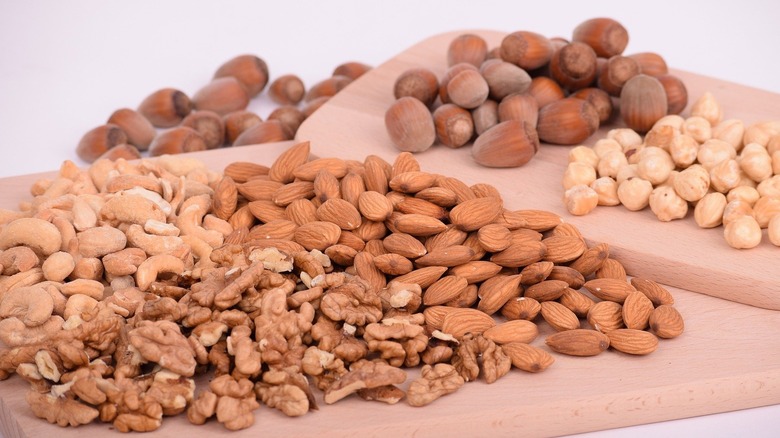Can Eating Nuts Cause Heartburn?
In general, nuts are regarded as a healthy snack that can be good for your heart (via Mayo Clinic). Research has shown that nuts may reduce your risk of blood clots, lower the levels of low-density lipoprotein (LDL) cholesterol and artery-clogging triglycerides, and decrease your risk for high blood pressure.
In addition to these heart-healthy benefits, nuts also contain a number of antioxidants and nutrients that will do your body good (via Samaritan Health Services). Brazil nuts, for example, have high levels of selenium, which is good for thyroid function and the immune system, while hazelnuts' high folate content helps support healthy cell growth. Almonds are rich in vitamin E, which is another immune system booster. A 2010 study published in Nutrients showed that nut consumption can be linked to a reduction in heart disease and gallstones, as well as hypertension and diabetes.
But for all the health benefits that come from adding nuts to your diet, it's possible that nuts can also come with a negative side effect, namely heartburn. However, before you decide to put nuts back on the shelf, take a deep breath. There may be a link to nuts and heartburn, but it's not as black and white as you might think.
Nuts' high fat can trigger heartburn
According to the American Gastroenterological Association, heartburn is generally caused by acid reflux, also called gastroesophageal reflux or GERD. This occurs when the acid in your stomach flows back up into your esophagus, causing a burning sensation in your throat, chest, and neck. It's not a life-threatening condition, but the more serious or chronic cases may require a visit to a gastroenterologist.
Tree nuts, such as almonds, cashews, walnuts, and brazil nuts are both fatty and oily, which is a dangerous recipe for heartburn (via Palmyra Surgical). The high-fat content in these nuts can cause your esophagus to relax and trigger acid reflux. This doesn't apply to everyone, of course, as there are plenty of people who enjoy nuts who don't experience any heartburn symptoms. However, if you have tree nuts in your diet and are experiencing acid reflux symptoms, it could be a good idea to consult your doctor.
Additionally, tree nuts have been linked to cases of eosinophilic esophagitis, also known as EOE (via Johns Hopkins Medicine). This is an allergic condition when the esophagus doesn't contract properly as a result of inflammation. Patients with EOE can experience abdominal pain, difficulty swallowing, and heartburn. Since the majority of EOE cases are triggered by food, the trick is to begin removing certain food from your diet, including nuts, and see how your symptoms improve.
Sometimes nuts can help heartburn
While it's possible that some nuts may be linked to some acid reflux symptoms, according to Gastroenterology Consultants of San Antonio, there's also evidence to suggest that nuts can be used to alleviate heartburn. Nuts like almonds may aid in the absorption of stomach acid, thereby reducing your heartburn symptoms.
On top of their ability to absorb stomach acid, some nuts are alkaline, with a higher pH that can effectively minimize the acid in your stomach (via Johns Hopkins Medicine). Almonds are an alkaline nut and also contain fiber and healthy fatty acids (via OnPoint Nutrition). However, you'll want to make sure you avoid pairing nuts with other high-fat foods, as excess fat consumption can be a heartburn trigger.
With these facts in mind, and given that different nuts contain different ingredients, each impacting your heartburn symptoms differently, it's best to consult with your primary healthcare physician or gastroenterologist to determine which nuts will sit best in your stomach.



